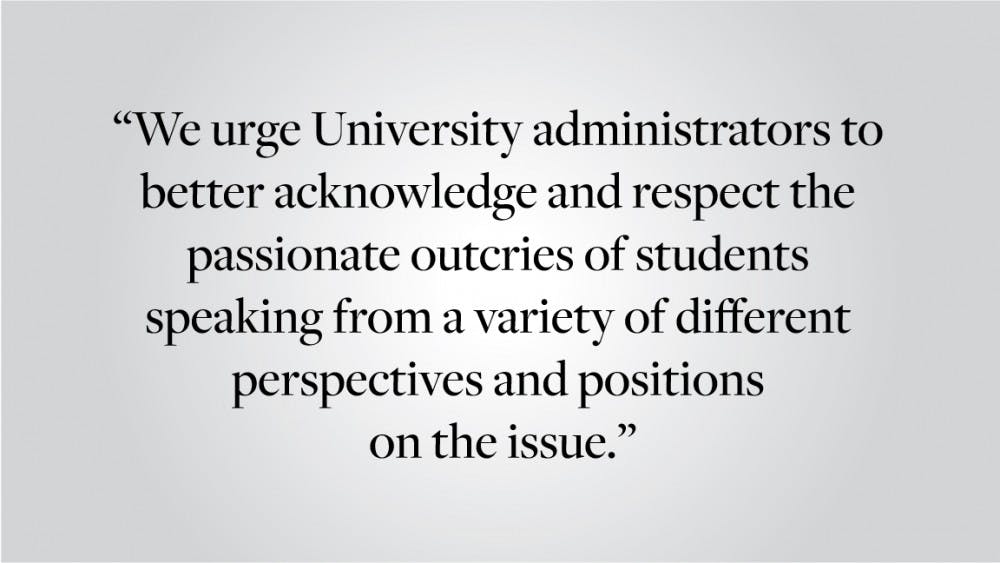On Monday, March 30, the undergraduate community received an email from Dean of the College Rashid Zia ‘01 outlining the University’s updated grading policy in response to the COVID-19 pandemic’s sweeping academic consequences this semester. According to this email, students would be able to change their grade option to Satisfactory/No Credit for any course between April 13 and April 17, and professors could petition to make their courses mandatory S/NC. This initial email followed a petition — signed by more than 2,400 Brown students, faculty and staff — calling upon the College to implement a Universal Pass policy. On Friday, April 3, the community received a follow-up message from Dean Zia that extended the deadline for students modifying their grade options to May 1, the final day of instruction.
We do consider this extension to be a positive development, and one which indicates at least some degree of consideration for community members’ feedback on the initial plan. But as a whole, we are disappointed by administrators’ largely opaque and often dismissive policy communications, especially when responding directly to students voicing serious concerns. While we do not write to advocate that the University adopt one particular grading policy over another, we strongly urge the University to more carefully consider how it communicates these policies to students, and most importantly, to be forthright and clear about how student feedback is weighted in the decision-making process. Additionally, we urge the University to further clarify its expectation for students regarding their academic performance and standing in a semester that cannot accommodate “business as usual.”
Throughout communications related to grading policy from administrators, there has been a resounding lack of transparency regarding how, exactly, this major policy decision was made, including who specifically was consulted, why they were consulted and the extent to which their insight was ultimately taken into consideration. As of now, we only know that 1) the initial grading policy decision was made based on a series of emailed student testimonies, of which Dean Zia found the “most compelling” to be emails framing letter grades as an opportunity for hard-working students to “showcase their resilience in the face of adversity” and 2) that the April 3 update came after “careful consultation with faculty, staff and students as well as the relevant governing academic committees.”
To be sure, we understand that the University is currently working to adapt its policies under unexpected and profoundly challenging circumstances. We also acknowledge that it is juggling a vast number of important and often competing priorities beyond its grading policy; we understand that among these concerns must be the needs of its faculty and the integrity of its curriculum. But students are the core of the University. Just as we urge our fellow classmates to respect the immense logistical challenges facing the University today, we also urge University administrators to better acknowledge and respect the passionate outcries of students speaking from a variety of different perspectives and positions on the issue.
Dean Zia’s email, while well-meaning, revealed to us a glaring disconnect between administrative politics and the real-time pulse of community discussion. While we do not ask or expect the University’s grade policy decision to perfectly align with any specific student proposal, we do expect the University to ensure that its decision-making process includes fair and thorough consideration of student needs and priorities. It is unclear to us whether this was the case, as communications thus far have revealed little information about the decision-making process and how student concerns were weighted among other priorities.
There also remains a distinct lack of information regarding the details of the actual academic policy. What precisely does the University expect of students under such unimaginable circumstances? And what are the potential ramifications for students who cannot complete their academic obligations as normal (for any number of reasons, including lack of access to necessary resources and/or equipment, mental and physical health concerns or newly increased family or employment obligations), particularly if they are in their final semester at Brown?
The April 3 update states that “in order to promote academic continuity, the Committee on Academic Standing has established guidelines to assure that no student’s academic standing will be adversely affected by their coursework this Spring 2020 semester.” But nowhere does it clarify what those guidelines are or how they were decided upon. If a student were to fail or NC their courses for reasons relating to COVID-19, although they may be guaranteed good academic standing in the new policy, what exactly would the long-term consequences be for that student? Would they be expected to attend an additional semester or semesters at Brown to complete those requirements? And, if so, would they be eligible for financial aid during that additional semester? Have there been or will there be updates to academic leavetaking policies?
We understand that no policy solution can be perfect for everyone, and that administrators have been facing a tidal wave of significant responsibilities to fulfill and consequential decisions to make for weeks. But regardless of the specific grading policy they decide to implement this semester, administrators must remain sensitive, attentive and responsive to the community’s concerns. We urgently hope that similar communications going forward adopt a doctrine of care and support, and that the process of putting together new policies tailored to these extraordinary circumstances is shared with all those who will be affected by them.
Editorials are written by The Herald’s editorial page board. This editorial was written by its editor, Krista Stapleford ’21, and members Amanda Brynn ’21, Riley Pestorius ’21, Vicky Phan ’21 and Dylan Tian ’21.

ADVERTISEMENT




